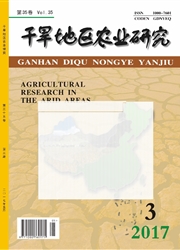

 中文摘要:
中文摘要:
探讨了1.6 m和2.0 m带宽不同玉米行距下玉豆带状套作系统共生期水分分布及水分利用率的变化。结果表明:随着玉米行距的增加,地面上玉米叶片空间分布不同,形成窄行部叶面积指数高于宽行,导致土壤水分蒸发、穿透降雨量和土壤水分都表现为玉米行〈玉豆行〈大豆行,玉豆带状套作共生期穿透降雨量分布不均和玉米大豆对土壤水分吸收是造成土壤含水量分布不均的主要因素;两种带宽下带状套作玉米产量和群体产量随玉米行距的增加表现为先增加后持平,在玉米行距为50 cm时,带状套作玉米产量和群体产量最高;两种带宽下玉米行距为50 cm时带状套作水分利用率最大,分别为23.06 kg·hm^-2·mm^-1和26.60 kg·hm^-2·mm^-1,总体上较单作提高了38.92%和22.98%;两种带宽下水分当量比分别为1.45~1.66和1.60~1.79,2.0 m带宽比1.6 m带宽更加有利用于提高农田的水分利用效率,玉米行距在40~50 cm时更能有效提高群体的水分利用效率。
 英文摘要:
英文摘要:
This paper was about the changes in water distribution and water use efficiency in maize rows with 1. 6 m and 2. 0 m width under the maize-soybean strip intercropping systems during the symbiotic period. It was shown that with the increase of maize rows,spatial distribution of maize leaves on the ground was different. LAI of narrow rows was higher than that of wide rows,resulting in soil evaporation,throughfall,and soil moisture in the order of maize rows maizesoybean rows soybean rows. Uneven distribution of throughfall and the differences in abilities of maize and soybean absorbing moisture were the main reasons for the uneven distribution of soil moisture during the symbiotic period. When distance between maize rows became large,the group yield and maize yield were first increased and then remained steadily,reaching the highest with a maize rows distance at 50 cm. When maize rows distance was 50 cm,the water use efficiencies of the two width strips were the highest,23. 06 kg·hm^-2·mm^-1and 26. 60 kg·hm^-2·mm^-1,respectively.Overall speaking,water use efficiencies by the maize-soybean relay strip intercropping were 38. 92% and 22. 98% higher than those by monoculture. The water equivalent ratios were 1. 45 ~ 1. 66 and 1. 60 ~ 1. 79 under cultivations with two kinds of strip width. 2. 0 m strip width could improve more of water use efficiency of farmland than 1. 6 m strip width.When maize rows were 40 cm to 50 cm,maize- soybean relay strip intercropping could improve water use efficiency.
 同期刊论文项目
同期刊论文项目
 同项目期刊论文
同项目期刊论文
 期刊信息
期刊信息
